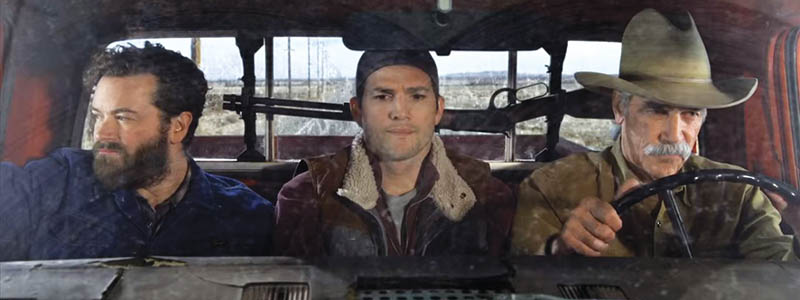Half-baked
Netflix’s newest batch of comedies disappoints
Every comedian wants to work with Netflix. Who wouldn’t? The streaming service-turned-original content producer offers a creative playground free from the constraints of ad-fueled network television. Netflix’s business model thrives on variety and risk-taking. It’s too bad the new offerings from Will Arnett, Ashton Kutcher and Judd Apatow forgot to focus on the most important aspect of a comedy: being funny.
“Flaked” is a strange creature, too niche for its own good. Its lived-in vibe, shot entirely on location in the sun-baked hipster haven of Venice, CA, makes for an intimate view of an intriguing setting. The characters, led by recovering alcoholic Chip (Will Arnett), meander through neighborhoods and conversations without much of a plot to propel them. The writing tries to be cutting and self-aware but comes off weak and irritating instead, especially during any of the awkward tonal shifts to melodrama. There’s a good show in there somewhere, but it gets lost in a haze of aimlessness and cliché.

“The Ranch,” a single-camera sitcom starring Ashton Kutcher and Sam Elliott, plays to the cheap seats. Kutcher is Colton, a failed football player visiting his family in Colorado where his dad, Jameson (Elliott) runs a bankrupt ranch. He’s not happy to have Colton back in his life, at least until 20 minutes in (surprise!) when Colton decides to stay and become the new farmhand. The insulting rapport between the two grows tiresome quickly. An undercurrent of sexism runs through several jokes and the creators too often fall back on lazy stereotypes. The occasional f-bomb is the only thing that sets it apart as a Netflix original—scrub the language and it’d fit right in with the lowestcommon-denominator sitcoms on ABC.
 The misfires of “Love” are the most vexing of all. Judd Apatow is a master of finding the endearing within the lewd, whether it’s the sexual exploits of Steve Carell’s Andy in “The 40 Year-Old Virgin” or the stoner hi-jinks of Apatow’s beloved “Freaks and Geeks.” Yet, the characters at the center of “Love,” Mickey (Gillian Jacobs) and Gus (Paul Rust), initially come off as extraordinarily bland and un-sympathetic. Mickey is an erratic mess, while Gus is a “nice guy” prone to awkward encounters. Their dysfunction and the raunchy dialogue is painful to watch in the early episodes. The slow-churning plot leaves the audience considering why these characters merit time and attention, and the comedic momentum is frequently broken by the misguided sitcom structure. The romantic struggles of white, middle-class Los Angelenos have been well-documented on TV (see: Hulu’s “Casual,” or FX’s criminally under-appreciated “You’re the Worst”). Many critics say that the second-half of the season justifies the weak start, so Netflix’s binge-ing format may work to “Love’s” benefit. Still, your time is better spent elsewhere (seriously, with “You’re the Worst”).
The misfires of “Love” are the most vexing of all. Judd Apatow is a master of finding the endearing within the lewd, whether it’s the sexual exploits of Steve Carell’s Andy in “The 40 Year-Old Virgin” or the stoner hi-jinks of Apatow’s beloved “Freaks and Geeks.” Yet, the characters at the center of “Love,” Mickey (Gillian Jacobs) and Gus (Paul Rust), initially come off as extraordinarily bland and un-sympathetic. Mickey is an erratic mess, while Gus is a “nice guy” prone to awkward encounters. Their dysfunction and the raunchy dialogue is painful to watch in the early episodes. The slow-churning plot leaves the audience considering why these characters merit time and attention, and the comedic momentum is frequently broken by the misguided sitcom structure. The romantic struggles of white, middle-class Los Angelenos have been well-documented on TV (see: Hulu’s “Casual,” or FX’s criminally under-appreciated “You’re the Worst”). Many critics say that the second-half of the season justifies the weak start, so Netflix’s binge-ing format may work to “Love’s” benefit. Still, your time is better spent elsewhere (seriously, with “You’re the Worst”).
“Flaked,” “The Ranch,” and “Love” ultimately fall flat because they rely on self-involved assholes to carry their narratives, but none are as witty or charming as the writers think they are. There’s no beating heart beneath the mean-spirited barbs—all three shows could learn a thing or two from “Unbreakable Kimmy Schmidt” and “Master of None.”
Don’t get me wrong—there are delightfully weird moments in each show. The problem is, the sheer quantity of content available is so seemingly infinite that if a series doesn’t immediately demand our attention, it’s overwhelmed by waves of new programming. In the end, these new offerings aren’t entertaining enough to demand your attention, nor banal enough to ignore completely. They just should have been better.
For more from Landry, read his review of season four of "House of Cards."


.jpg)
.jpg)
